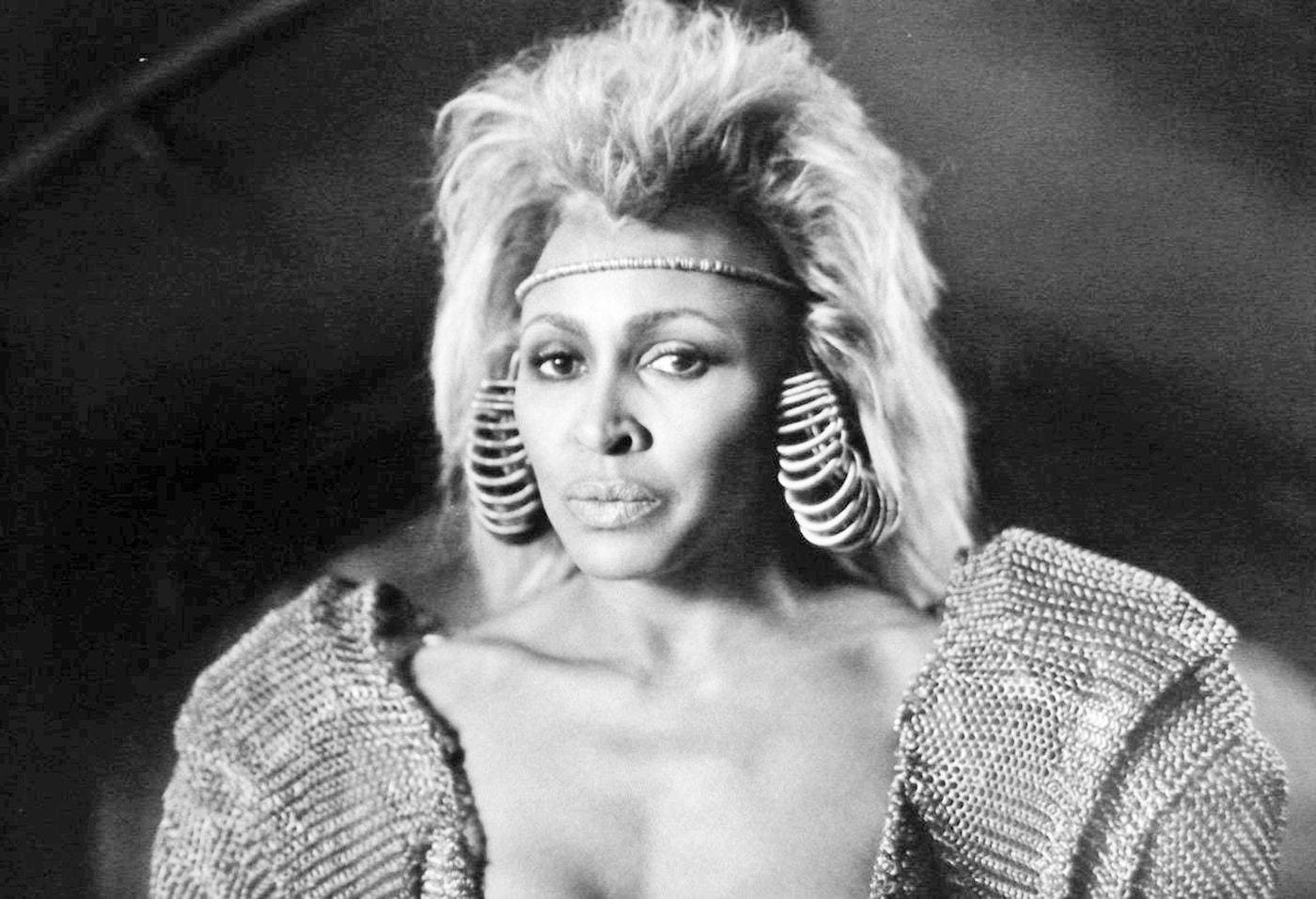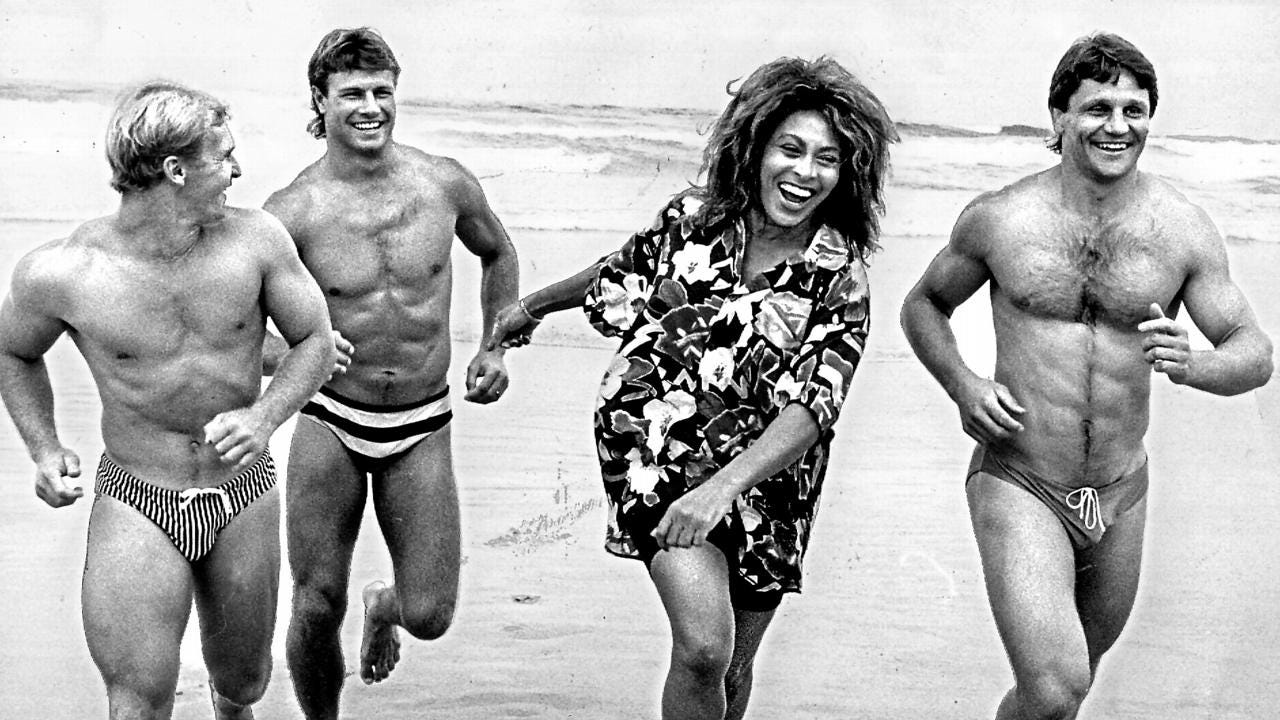Simply the Best
Footy, Tina Turner, and underage rock concerts
Housekeeping: this is the tip link; you can tip as much or as little as you like. I have complete control over tips, not Substack.
Do remember this Substack is free for everyone. Only contribute if you fancy. However, if you put your hands in your pocket, money goes into Lorenzo’s pocket.
This, meanwhile, is the subscription button, if that’s how you prefer to support the writing around here:
As a young teenager, I talked my way into a Tina Turner concert at Twin Towns Services Club in Tweed Heads. Just over the state border in New South Wales, it offered a cornucopia of delights unavailable to those of us who lived in Queensland.
A musical memory
Here, I’m going to try to do something that’s usually the province of other writers I admire. I’m going to share a musical memory. If you want to know what I mean, here’s Josh Slocum applying his skills to a piece on The Carpenters, while Ted Gioia works a similar bit of magic with Doris Day.
Australia, where I grew up, has an even more intensely federal system than the United States. In the Queensland of my youth, busloads of people with signs on the front reading POKIES travelled over the border to New South Wales. Poker machines were illegal in conservative Queensland, as were abortion and prostitution.
Meanwhile, in liberal NSW, abortion and gambling were legal while prostitution was decriminalised. If the bus in question had dark tinted windows and no POKIES sign, you knew it was full of women heading over the border to get abortions.
The presence of poker machines meant that Returned Servicemen’s League (RSL or “Rissole”) Clubs in NSW were much richer than those in Queensland. Twin Towns—given Tweed Heads’ proximity to the Queensland border and that state’s deprived population—was especially notable. It had the facilities and the money to host top international acts.
And in 1980s Australia, Tina Turner was at the top of the entertainment and musical tree.
She wasn’t just a chart-topper. She was also Aunty Entity in Mad Max: Beyond Thunderdome, playing opposite Mel Gibson in the third part of an already popular Australian film franchise.
Even more crucial, however, was the extraordinary nexus she had with Rugby League football, one of Australia’s (numerous) football codes.
Footy fights
Reflecting the country’s extreme federalism, Australia in the 1980s had no national football code. If you’re American, imagine only half the states took an interest in your NFL. If you’re British, imagine the Welsh passion for Rugby Union was not only more widespread across the four Home Nations but coupled in those areas with utter disinterest in round-ball football.
Cricket, of course, was Australia’s summer game. A unifying winter game, though—no chance.
In Queensland and New South Wales, people played rugby league and rugby union. There was a further division between those two codes based on social class. Unlike New Zealand—where it’s the national game—rugby union in Australia was traditionally a sport of the middle and upper-middle classes, an amateur competition to be played by gentlemen.
League, by contrast, has always been professional. It emerged from an 1895 schism concerning payments to players. The rules for the two rugbies then diverged.
The rest of the country, meanwhile, plays Australian Rules Football. An idiosyncratic blend of Gaelic football and an indigenous game known as Marngrook, that’s the one where it looks like the people playing it are descended from kangaroos.
The two sentences above give Queenslander me away. I grew up in a sporty household and played various school sports. I went to the same school at the same time as a bloke who went on to be vice-captain of the Wallabies.
I didn’t even know the rules to “Aussie Rules”.
Enter Tina Turner
The class system underlying the two rugby football codes in Queensland and NSW meant league was irreducibly working-class. Not only were its players male and working-class, so was its audience.
When league’s advertising powerbrokers called on Tina Turner to promote their sport, they were taking a real risk. It’s since emerged that there was a huge internal shit-fight among league’s administrators about importing an American act to promote what was considered Australia’s only true working-man’s game.
Turner’s first campaign in 1989—featuring the song What You Get Is What You See—came close to being scuppered at the last minute.
To everyone’s great relief, her campaign was a success. Incredibly, female viewership of rugby league games increased by between 60 and 70 per cent. The class composition among viewers also began to shift, with people who’d always preferred rugby union discovering that rugby league players were, as kids say these days, “relatable”.
Most importantly, Turner’s campaign made it acceptable for parents to let their little boys play league, and junior competitions flourished.
Turner certainly enjoyed the players’ company, and was impressed by their physical courage. To this day, all Australian football codes are accompanied by a minimum of padding and protection.
A year or so later, Roger Davies—Turner’s Australian-born manager—told league’s powers that be Tina had a new song she was planning to record at the end of the year. The song was called Simply the Best, and was written with sporting achievement and ambition in mind.
This time, league went all in, and the rest, as they say, is history. Players were astonished Turner came back to Australia to film another advertisement, topping it off with a grand final performance at half-time.
One comment—from league superstar Benny Elias—has always stayed with me. “We thought we were stars back then, but we were a pimple on the arse compared to what she was”.
Another thing. You’ll notice, in both ads, the league competition was “The Winfield Cup”. Winfield is a cigarette brand. It was still all right for cigarette companies to sponsor sporting competitions (for years, Benson & Hedges sponsored state and national one day cricket in Australia).
If I want to feel old, I replay a mental film reel of going to the shops on Sunday to pick up a paper and a pack of smokes—usually Winnie Blues—for my dad. I was about eight.
Sneaking about
Twin Towns was, at root, an RSL club. The presence of gambling on the premises—a lot of gambling—meant two things. As a rule, you needed to be signed in by an existing member, and you had to be over 18. This was policed. At the time, NSW’s state government was more concerned about gambling underage than drinking underage.
Even in more conservative Qld, both police and publicans would nod and wink at young people ordering a schooner, or getting an older patron to buy one for them. As long as we didn’t do something idiotic—like turn up at the bar in school uniform—and looked reasonably mature, moderate drinking was allowed to slide.
Because of its illegality in Queensland, gambling was entangled with organised crime and what we later learnt was a spectacularly corrupt police force. I can honestly say I never encountered it as a kid. The first time I saw banks and banks of poker machines lined up against the wall plain as day—as well as a roulette wheel—was walking through Twin Towns to the venue for that Tina Turner concert.
Purchasing a ticket was simple enough. I was doing work experience at a law firm in Brisbane at the time and walked to the local ticket office after work. I suspect I looked like an office junior or, at a pinch, a legal secretary, and paid in cash. Mind you, everyone paid cash in those days.
I’d also grown most of the way to my adult height by that point, so was already around 5’11 or 6’. I’ve never considered this particularly tall (in part because one of my brothers is taller than me, and when you grow up with a really big person, it seems unremarkable).
However, in the 1980s, a six-foot woman really was freakish, even in an outdoorsy, meat-eating place like Australia. I was the tallest girl throughout my high school years while only a handful of the boys were taller than me. It was this, I’m sure, that allowed me to blag my way into Twin Towns. Yes, I was dressed very smartly, and made up. Yes, I had a ticket, properly paid for. But I was taller than both the security guards and had the sort of verbal confidence that goes with being well brought up.
Of course, Tina Turner brought the house down. And by singing a fair bit of her back catalogue, she introduced me to other times and other places that were, you know, a bit like Queensland.
It was impossible to hear Nutbush City Limits (“twenty-five was the speed limit; motorcycle not allowed in it”) and not be reminded of what an aspect of real life was like—especially for Queenslanders.
Later, I learnt Mark Knopfler wrote Private Dancer. He gave it to Turner because he didn’t think a man could sing it and be believed. Then when Turner released her version, he hated the Jeff Beck guitar solo she inserted, thinking it “ruined the song”. Artistic differences, folks. They’re a thing.
RIP Tina Turner, thanks for making my youth a better place.




You did what you set out to do. Or, maybe I'm thinking of what I set out to do with pieces in this vein.
I could see, hear, and feel the world of your youth reading this. The fact that an American song, from a quintessentially American singer, connected to an Australian girl's (and boy's) world is touching and I didn't expect it.
Before your account, I didn't know Turner had done anything for Australian Rugby. Nor did I know football in your country had a class split (fascinating). It makes me smile that Turner sang for the working class boys.
You put a bittersweet smile on my face. Really well done. Thank you.
This was lovely. You really took us all there.